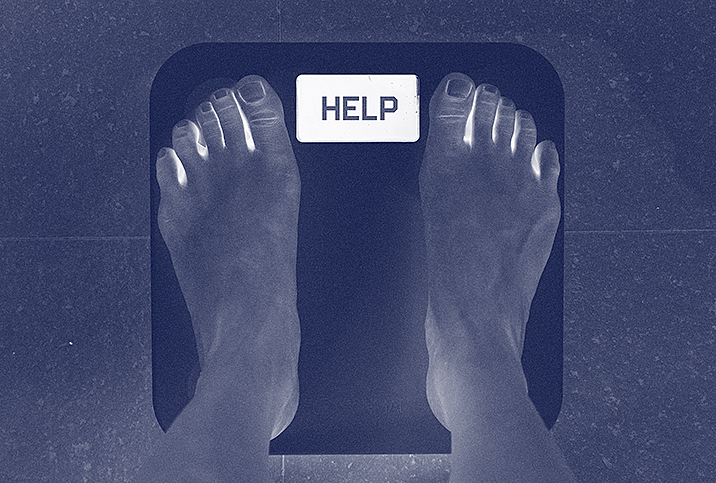Supporting Someone With Binge Eating Disorder

While it gets less media attention than others, binge eating disorder (BED)—only recently classified as a formal diagnosis in 2013—is by far the most common eating disorder in the U.S. Current estimates indicate BED impacts 5.5 percent of Americans at some point in their lives, three times as many as those suffering from anorexia and bulimia combined.
An overview of BED
Binge eating disorder is characterized by uncontrolled episodes of consuming extremely large quantities of food, often rapidly and past the point of discomfort, even when the individual isn't hungry. These episodes, termed binges, are often followed by feelings of guilt, sadness and shame.
The illness is thought to be linked to abnormal levels of the chemical dopamine in the brain, which alter appetite, cravings and enjoyment from food. Risk factors include being female, family history, dieting and already having some form of mental illness. Signs of binge eating disorder include:
- The consumption of large amounts of food in a relatively short period of time.
- Eating throughout the day while skipping planned, group meals.
- Disposing of empty containers secretly.
- Developing a fear of eating in public or around others.
- Experiencing weight fluctuations.
- Becoming preoccupied with diet and appearance.
- Developing gastrointestinal (GI) issues.
- Frequently dieting or restricting food groups.
- Becoming socially isolated.
- Experiencing decreased self-confidence.
Women are more likely to develop binge eating disorders than men, and 2 in 3 sufferers are overweight or obese. The disease increases the risk of obesity and weight cycling, often resulting in medical conditions including high cholesterol, hypertension, osteoarthritis, sleep apnea, heart disease, diabetes and GI distress, as well as mental health issues (anxiety, depression and suicidal ideations). BED can have a negative impact on all aspects of life, including causing relationship difficulties, problems at work and financial distress.
Unfortunately, recovery is challenging without formal acknowledgment, and research estimates less than 30 percent of people with binge eating disorders are currently receiving treatment, according to a survey from the National Eating Disorders Association (NEDA). The illness is treated with a combination of psychotherapy and medications, including topiramate (an anticonvulsant that curbs appetite) and antidepressants.
What not to do
Don't talk about or recommend diets—they won't help. In fact, neither will recommending exercise with the goal of weight loss. Never minimize the illness, or insist you know how they're feeling. Critically, never threaten or give ultimatums—fear tactics are not therapy.
As with any mental illness, substance use disorder or process addiction, don't suggest "being strong" as a way to curb the disease. Conquering a binge eating disorder isn't about willpower—it is much more deeply rooted in neurobiology, and overcoming it requires the assistance of a trained professional. Even so, don't try to force someone to seek treatment they're not comfortable with or not ready for.
How you can really help
Before you can help someone suffering from BED, you have to understand this disorder yourself. Binging may seem like a loss of control or an inability to refrain from food, but in reality the illness is extremely nuanced.
NEDA and the National Eating Disorders Collaboration (NEDC) are good places to start your education. While elements of the illness are similar among sufferers, each person is very different. To best understand your loved one's experience, respectfully ask if they'd be comfortable sharing their personal experience and struggles. If you do your best to understand things from their perspective, you'll be better equipped to be helpful.
You can begin the process of normalizing eating by scheduling casual meals together, keeping to a balanced diet and focusing on your own positive relationship with food. Setting a good example—with no guilt, diet culture talk, references to weight (your own, a celebrity's, anyone) or shaming language—can be a positive influence, and will reduce your chance of triggering any negative feelings. The Health at Every Size community has resources to unlearn diet- and weight-centric thinking in this regard.
Don't talk about or recommend diets—they won't help. In fact, neither will recommending exercise with the goal of weight loss.
In the meantime, consider shifting the mealtime conversation to activities or interests. Additionally, engaging in healthy physical activity together—walking around the block qualifies—can improve both physical and mental health.
Always encourage therapy, as talking with others can make them feel less alone. Overeaters Anonymous, or OA, hosts group meetings all across the world that promote a 12-step model for recovery. Family therapy can also be helpful to get everyone on the same page and promote a positive healing environment. You can't solve your loved one's problem, but you can encourage them to seek out new sounding boards, as well as sources of kindness and encouragement.
In the meantime, don't forget to take care of yourself in the process and set the necessary boundaries you need: You can't be helpful to someone else if you're not at your best.
Binge eating disorder is a painful condition that can result in extreme emotional distress with long-term complications for physical and mental health. Recovery is very possible, with effective support and treatment. As the saying goes, be a part of the solution, not the problem.




















